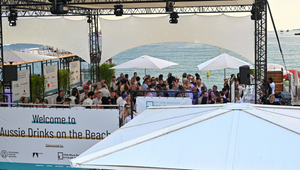
The Directors: Bill Irving

Bill Irving is an award-winning commercials director represented by Truce Films in Australia. He has an affinity for sport but also works comfortably in a social justice space, crafting stories about people or causes he believes in. He’s directed campaigns for clients at home and internationally, including Clear shampoo, YoPro, Cobram Estate, and for Australia’s biggest sporting codes as part of Fox Sports. He sat down for a chat about the similarities between sport and art, creative collaboration, and the injustice of Australia’s refugee policies.
LBB> One of your earliest experiences was working in-house at Fox Sports. What are some highlights from your time there?
Bill> That was a cool job because my creative director trusted me, and I was passionate about what I was doing. I was there for three very productive years and was able to learn and grow a lot.
Early on I had an opportunity to create an NBL launch spot with a small budget but full control, so I treated it like a short film: I called every person I knew involved in the game and made a spot that was about Australian suburban basketball, and how it feels to play.
Together with James Brown, my best mate and DP, we basically made this love letter to Australian basketball. It was pretty successful and it won the Global ProMax Gold award for Most Outstanding Sports Promo in the world that year. That was cool.
That model of working became what I did at Fox. I got a brief and a budget and a deadline, and I did everything else myself. In the following years as the spots got bigger, I won further ProMax awards for writing and editing as well as for directing.
LBB> Did your interest in sport and the arts seem in conflict to you when growing up?
Bill> Not in my guts: sport is human expression just like any other art form. But in terms of the cultural expectations, I thought you had to be a certain type of person to be a football player, or a certain type of person to be creative, partly due to growing up in country Victoria.
When you’re a teenager in a smaller town, you’re defined by what you aren’t rather than what you are. [But] the link between sport and the arts was always clear to me.
In all the sports I’ve played, and all the sporting situations I’ve been in with people, I’ve never seen people play sport in a way that doesn’t represent who they are in life. That’s what art is too – people expressing themselves.
In terms of bringing that thing to the screen, the surface level of what interests me is the motion, and the body, and the physicality of it all. But then, beyond that, capturing things that people can do in an instant that have taken them a lifetime to be able to do. For me, that’s a metaphor for what all people are able to do when they are faced with adversity – in sport it’s an artificial adversity, but it is still adversity nonetheless.
LBB> Have you found sportspeople to be in any way challenging to work with as talent?
Bill> I worked with Ash Barty on one commercial and she was just so even-keeled: the lines of what she would do were so clear. But her commitment to do what she was willing to do [to get the job done] was also just so clear and apparent. She was amazing and I couldn’t imagine anything flustering her; you see that in her matches. Her strength is her ability to stay level.
I think whether you’re speaking with a famous athlete or a person on the street that you’re interviewing for a documentary, if you help people feel comfortable then they will draw other people in. People can smell inauthenticity so easily. Comfort creates comfort: you can feel that through the screen and the audience feels that. They feel that warmth.
"EVERY MILLIMETRE" (Directors Cut) for YoPro from Truce Films on Vimeo.
LBB> You’ve worked with so many people across the different areas of your career: is there anyone that stands out as particularly meaningful?
Bill> In terms of collaborators, my cinematographer, James [Brown; co-partner of Bill+Brown] is my rock – we’ve done everything we can together since film school. The experience of making Watan, our feature doc, came about because of our shared disgust at Australia’s treatment of refugees. It’s just such a brutal injustice. I continue to be passionate about this issue and creating work in this space.
LBB> Can you tell us a bit more about the process and experience of making Watan?
Bill> So James shot the footage over three weeks in Jordan. It wasn’t a film then. James had travelled with a photojournalist intent on capturing interviews with people and seeing it for himself. He came back with the rushes and we went, ‘There’s a film in here…’ So then we translated, edited and constructed the story in Australia.
We made it without any ambition except for it to be finished and be as good as it could be. Documentary is so fraught because of the presence of the camera and the blurring between narrative and doco, but there’s something in that film that’s super sweet. It’s very pure. It’s still the most pure and satisfying filmmaking experience I’ve had.
Throughout the process, we were asking ourselves, ‘How can you, as a 30-something white person, contribute to the culture in a meaningful way?’ Because my 30-something white male perspective has been every piece of culture ever made for the last hundreds of years. I think the answer to that is to try to use your privilege to elevate other more marginalised voices. I try to do that where I can in all my work now, be it commercial or creative.
WATAN :: Trailer from Truce Films on Vimeo.
LBB> A lot of Bill+Brown work speaks to Australia’s cruel refugee policies, do these issues spark your interest or are you approached by members of the community?
Bill> With Watan, Chasing Hope, Anisa’s poem [The Year is 2020]… when you do work about one theme, you naturally keep tumbling towards it again and again. Probably because Australia’s refugee policies are such a brutal injustice. Our national shame.
I am keen to keep working in this space. I want to know how to extend on Watan, because while it was a very satisfying filmmaking experience and I’m really happy with the reception it had – it’s used at Melbourne University now as a teaching tool, which is so nice and great for it as a film – I feel really uneasy about the fact that most of the people in that film are still in that camp. It’s not like we made any money out of it, and what little it made we donated, but the next thing I want to do if I put people’s stories on screen is to find a way for those people to get something out of it.
"THE YEAR IS 2020" by Bill Irving and James L. Brown from Truce Films on Vimeo.
LBB> How was collaborating with a performance poet in The Year is 2020?
Bill> I loved working with Anisa – she’s just so young and angry, and I remember being that angry in my 20s but not having the means to make anything good from it. I wish I’d had the skills I do now to execute some of the angry ideas I had… or someone to help me do that! [laughs]
That film felt like the opposite of Watan to an extent: we’d done this gentle, beautiful, thoughtful, swelling, meditative film and The Year is 2020 was like a sledgehammer. It felt like that because that’s how Anisa writes. It was nice to stretch those muscles again. Anger is a gift – don’t let them tell you otherwise!
You can view more of Bill’s stunning work here.















